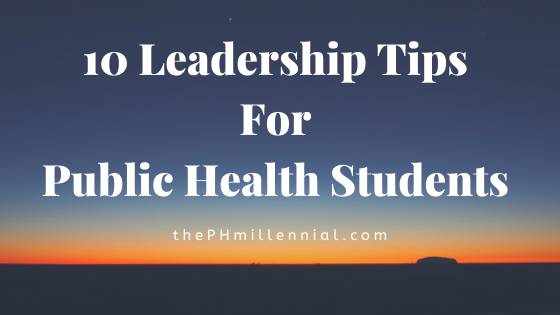Leadership for public health students is a question I get quite a few of. I have had the opportunity to dive into different leadership roles and have found them helpful to my journey.
Sometimes leadership is what we make of our experiences around us. Not everyone can be a official leader, but don’t let that stop you from being a leader in your group, among your peers or in any situation.
Here I’ll lay out some thoughts on leadership tips for public health students.
Support The Public Health Millennial on BuyMeACoffee
(Related: 5 Transferable Skills For Public Health Students)

Characteristics for Good Public Health Student Leadership
You can find leadership in many different forms. It can be being the president of a student organization to being the one to speak up in group projects. Try to make the most out of every situation to build on skills that can really help you set yourself apart.
- Accountable
- Open-Minded
- Good Decision Maker
- Actively Learning
- Good Listener
- Good Communicator
- Emotional Intelligence
- Aware of Limitations
- Teamwork/Willing to Serve Others
- Motivating and Inspiring
- Honest
- Positive Mindset
- Goal Oriented
Why LeaderShip Is Good For Public Health Students
There is probably no better time to be a public health student – debatably. As more and more public health opportunities arise out of the shifting dynamics of the world we live in, it’s important to capitalize on more than just coursework from school.
Everyone is graduating with their bachelors, masters or PhD in public health. Wouldn’t you want to set yourself apart? Developing leadership skills can be key for allowing you to get the edge on the next person when applying to your dream job.
Don’t take it lightly that your degree will be enough to help you get ahead. You have to be proactive in the things you do to have the best outcome. Leadership is a skill that can propel your early career and also can help you in all aspects of your life.
Where You Can Gain Leadership Skills in Public Health
- Student Organizations
- Webinars
- Group Projects
- Master Minds
- Seminars
- Boards, Taskforce, Councils
- Volunteering
- Event Planning/Coordinating
- Conferences
- Committees
- Case Competitions
- During Class
- Internships
- Labs
- Jobs
- Intramural Sports
- YouTube
You can basically learn leadership skills in all situations once you have the mindset of building it.

1. Know Yourself
The first thing any one trying to become a leader is for them to do some introspection. Find out who you truly are. Who do you want to be?
Great leaders are able to know themselves. Learn your strengths and weaknesses. Know what you like to do and what you don’t. Think about how you want to lead.
Leadership comes in many forms and variations – know the leader you want to become.
2. Establish Your Goals
Set goals not only for what you want to do, but what you want to learn as a leader.
Setting goals helps you set direction. It can also help to keep you on track with the plans and strategies you all do. Pivot as necessary.
Which goals did you achieve? Which did you miss? Think back on what you could have done differently and learn. Don’t sulk.
3. Know Your Leadership Style
When you know yourself you are able to find your leadership style.
Some people are more hands on, some like to be more hands off. Do you like to delegate, collaborate or a bit of both? Knowing how you personally likes to best lead is important. It’ll help you develop leadership techniques that will compliment your personality.
Here’s a Mindtool survey where it tells you your leadership style. I’d always take such a simple tool like this with a grain of salt considering there are so much nuances in our personalities.
(Related: 10 Tips To Be A Better Public Speaker)

4. Be A Listener
All great leaders are great listeners. We don’t know everything.
Be sure you are ready to be a astute listener. Remain open to others ideas, professional criticism, suggestions, and feedback.
Being an effective learner is being able to read more than just verbally. You have to grow emotionally intelligent and learn to read peoples non-verbal cues such as body language, eye and physiological responses. Most of human communication is non-verbal cues.
Listening is one of the best skills you can develop in life period. An active listening at that.
5. Motivate And Inspire
A good leader is able to inspire and motivate others.
If someone in your group or team needs reassurance or assistance, then offer it. What I’ve learnt is just a simple affirmation can make someone reduce hesitancy and be more confident in what they are doing. This works for homework, group projects and when leading teams.
Hear people out and listen to their ideas. Two brains are always better than one. And this will make people feel more empowered to speak up about their ideas and hesitancies.
When you motivate and inspire, you yourself will be motivated and inspired.
6. Keep Learning
To be the best you have to always continue to learn.
Try new things outside of your comfort zone. Strengthen up on some skills that you need to. Keep enriching your mind with new (but relevant) information and conversations. You never know what bit of information will spark a new ingenious idea for you.
Don’t ever forget to always keep learning and building on what you know. By bringing your best and most developed self to leadership (or life) every day will allow you to reap the most out of your 24 hours every day.
Learning can be so many things. It could be playing a new boardgame, reading a book, watching a documentary or even getting out into nature.
Just keep learning and you’ll be your best leader.

7. Give Thanks
Always show appreciation for something someone does – a simple “thank you” can go a long way.
People in general like to feel like they matter so give them a reason to. A simple act of kindness can make someone truly appreciate the work they are doing and sometimes even you.
Remember that it’s always collaboration over competition. If you want to go fast, go alone. If you want to go far, go together.
Teamwork truly can make the dream work so show appreciation when someone does well. And if be, gently speak to when you need to “apprehend”.
(Related: 5 Transferable Skills For Public Health Students Part 2)
8. Walk Your Talk
Don’t you dislike it when someone says one thing and doesn’t follow with actions?
Lead by example. Set the bar high in what you say and do and the team will follow suit. If you aren’t working hard why would someone else want to work hard for you?
You are going to be more credible as a leader if you follow through on what you say. People want to work with, alongside, for people that walk their talk. People want leaders that they can trust and know will have their back.
If you say you are going to do something, then make sure to follow through on it. Be a leader people want to listen and work for.
9. “Me” to “We”
You should know the fact that a good leader only happens when there is a good team.
Stop thinking selfishly and think about what would be best for your team. Have their interest in mind. Transform your thoughts from “me” to “we”. Good leadership means being a part of team – work collectively. Getting the best product will always be best when you think and work collectively.
This transformation takes time, but can be so beneficial when you are a team-leader. Meaning you are part of the team first and then leader second.
10. Informal Leadership
If you are not able to be a “formal” leader in some capacity there are SO many ways to develop leadership. As I stated earlier in the ways you can gain leadership, use all situations to get the most out of it.
Developing ways to tell stories that demonstrate leadership in interviews can be invaluable – whether that’s from a volunteer opportunity or being the VP of a student organization.
Don’t limit what people see as leadership to specific situations. In this ever changing world, there is opportunity for you to show up and be a leader. Go above and beyond to build these in informal ways and you will see how it can reward you.

Summary
Here are 10 tips for leadership for public health students. This should be helpful in wherever you are on your public health journey. Have an eye towards leadership
- Know Yourself
- Establish Your Goals
- Know Your Leadership Style
- Be A Listener
- Motivate And Inspire
- Keep Learning
- Give Thanks
- Walk Your Talk
- “Me” to “We”
- Informal Leadership
Being a leader is important. Gaining leadership skills as public health student can be pivotal in you getting ahead in your public health.
How are you going about gaining leadership skills?



